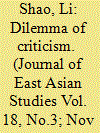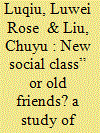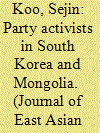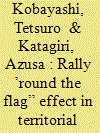|
|
|
Sort Order |
|
|
|
Items / Page
|
|
|
|
|
|
|
| Srl | Item |
| 1 |
ID:
166148


|
|
|
|
|
| Summary/Abstract |
In the aftermath of the 2006 and 2014 Thai coups, observers declared the resurrection of the bureaucratic polity. Bureaucrats, though, remained influential even during the period of 1992–2006, when elected politicians were thought to command the Thai state. Bureaucratic involvement in politics poses a challenge for dominant political science theories of politician–bureaucrat relationships, which draw heavily from principal–agent frameworks. I apply agency theory to Thailand, testing three different hypotheses derived from the theory. Examining legislative productivity and control over bureaucratic career trajectories, I find that elected politicians increasingly acted as principals of the Thai state from 1992 through 2006, and to a lesser degree from 2008 to 2013. Thai bureaucrats, though, have frequently engaged in the political sphere, blunting political oversight and expanding their independence vis-à-vis politicians. This suggests that the principal–agent model overlooks the range of resources that bureaucracies can bring to bear in developing countries, granting them greater autonomy than anticipated. As such, theories of the politician–bureaucrat relationship in developing states need to better account for the mechanisms through which bureaucrats exercise policy discretion and political influence.
|
|
|
|
|
|
|
|
|
|
|
|
|
|
|
|
| 2 |
ID:
166152


|
|
|
|
|
| Summary/Abstract |
Of the ten fastest growing economies since 1960, eight are in East Asia. As Haggard (2018) aptly demonstrates for Northeast Asia, two explanations account for this exceptional regional performance. On the one hand, neo-liberals committed to an Anglo-American night-watchman state (Krueger 1978; Bhagwati 1978; Edwards 1993; World Bank 1993; Pack and Saggi 2006) attribute performance to macroeconomic stability, provision of public goods, and openness to trade and investment. On the other hand, a heterodox group (Johnson 1982; Amsden 1989; Wade 1990/2004; Chang 2002, 1994; Rodrik 1995; Evans 1995; Lin 2009) focuses on market and coordination failures and the need for states to adopt pragmatic, ‘trial and error’ and selective approaches to high-speed growth. In this latter view, the strong developmental states of Northeast Asia used their embedded autonomy viz the private sector to overcome market and coordination failures to usher in rapid growth and technological catch-up.
|
|
|
|
|
|
|
|
|
|
|
|
|
|
|
|
| 3 |
ID:
166146


|
|
|
|
|
| Summary/Abstract |
Recent literature claims that China censors information that has the potential to ignite collective action. This article extends this finding by arguing that Chinese censors respond differently to political challenges than they do to performance challenges. Political challenges call into questioning the Party's leading role, whereas performance challenges are directed at the failures of public goods provisions. A survey experiment of about 60 media professionals finds that censors are inclined to block political challenges and to tolerate criticism of the government's performance. However, when criticism contains both performance and political challenges, censorship is far more likely. By exploring the range of censorship activities, the results suggest that the Chinese regime's reliance on popular support constrains its censorship decisions.
|
|
|
|
|
|
|
|
|
|
|
|
|
|
|
|
| 4 |
ID:
166151


|
|
|
|
|
| Summary/Abstract |
In this research note, we introduce a new dataset on China's national legislators. It provides descriptive information on one key parameter: the nature of the business owned by private entrepreneur deputies in China's National People's Congress (NPC) from 2003 to 2017. The dataset contains information on whether the deputy once worked as a government official, whether the deputy was a former top manager of a state-owned/collective enterprise, and whether his/her current company was a state-owned/collective enterprise before being privatized. We categorize deputies as “insiders” as long as they stratify one of the aforementioned backgrounds, whereas others as the “grassroots.” This dataset thus reveals two types of private entrepreneur deputies who are significantly different with regard to how they started their own businesses. These findings shed new light on the relationship between private entrepreneurs and the party-state in China.
|
|
|
|
|
|
|
|
|
|
|
|
|
|
|
|
| 5 |
ID:
166150


|
|
|
|
|
| Summary/Abstract |
Party activists are important for building party–voter links. This study focuses on the motivations of these activists and the hypothesis that economic factors are associated with more programmatic and policy-driven platforms. I examine a novel comparative survey data set of party activists collected in multiple districts in South Korea and Mongolia to determine whether national economic development, the local economy, or individual income shapes activist motivations. The results challenge the economic account and, instead, shed light on the importance of party characteristics, such as size, ideology, and whether a party has its roots in authoritarianism.
|
|
|
|
|
|
|
|
|
|
|
|
|
|
|
|
| 6 |
ID:
166149


|
|
|
|
|
| Summary/Abstract |
How do the president's calculations in achieving policy goals shape the allocation of cabinet portfolios? Despite the growing literature on presidential cabinet appointments, this question has barely been addressed. I argue that cabinet appointments are strongly affected not only by presidential incentives to effectively deliver their key policy commitments but also by their interest in having their administration maintain strong political leverage. Through an analysis of portfolio allocations in South Korea after democratization, I demonstrate that the posts wherein ministers can influence the government's overall reputation typically go to nonpartisan professionals ideologically aligned with presidents, while the posts wherein ministers can exert legislators' influence generally go to senior copartisans. My findings highlight a critical difference in presidential portfolio allocation from parliamentary democracies, where key posts tend to be reserved for senior parliamentarians from the ruling party.
|
|
|
|
|
|
|
|
|
|
|
|
|
|
|
|
| 7 |
ID:
166147


|
|
|
|
|
| Summary/Abstract |
This study examines the impact of China's growing territorial ambitions on Japanese public opinion. By experimentally manipulating perceived territorial threats from China, we tested two potential mechanisms of increased support for a conservative incumbent leader in Japan. The first is the “rally ’round the flag” model, in which threats universally boost support for the leader through emotion. The second is the “reactive liberal” model, in which support from conservatives remains constant, but threatened liberals move toward supporting the conservative leader. Two survey experiments provided no support for the emotion-based “rally ’round the flag” model, but they lent support for the reactive liberal model in explaining the impact on Japanese public opinion. However, the second experiment indicated that priming with an image of the prime minister that highlights his role as the supreme commander of the national defense forces completely eliminated the gain in approval rates among liberals.
|
|
|
|
|
|
|
|
|
|
|
|
|
|
|
|
|
|
|
|
|